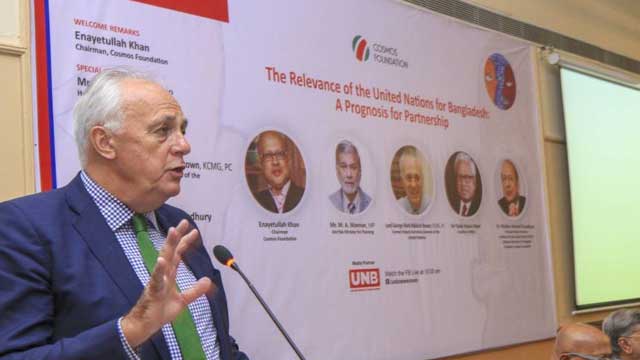Stating that there is no quick fix to the Rohingya crisis, former Deputy Secretary General of the United Nations Lord George Mark Malloch Brown on Saturday urged the international community to put pressure on Myanmar to resolve the issue.
“This is a classic dilemma of refugees … the reality is, these [refugee] problems don’t lend themselves quick fixes. It’s a steady problem,” he said while delivering the keynote speech at a symposium titled “The Relevance of the United Nations for Bangladesh: A Prognosis for Partnership” arranged by Cosmos Foundation at a city hotel.
Cosmos Foundation Chairman Enayetullah Khan delivered the welcome address at the event held with Iftekhar Ahmed Chowdhury, Principal Research Fellow, Institute of South Asian Studies, National University of Singapore, in the chair.
Malloch Brown said it requires “a great depth of patience and humanity” on Bangladesh’s side to manage this issue because a refugee population of that size in the part of the country is a huge burden.
“I don’t disagree with the assertion that not the UN but the states have not been forthcoming on with the political pressure on Myanmar to arrive at a solution,” he said.
The former UN Deputy Secretary General said a lot of political changes need to occur in Myanmar and the international community must exert pressure on it to secure that change. “I appeal to Bangladesh for patience,” he said, noting that these are not refugees who want to stay but conditions have got to be created to enable them to do that.
He said he believes the UN understands the frustration here and the need to find a solution. “I think [the UN] wants to work with Bangladesh in this coming session of the UNGA to make sure that this issue gets the political prominence and it needs to move towards a solution,” he said.
Malloch Brown said, “I think a critical bit of Bangladesh’s soft power of its global leadership comes from handling these problems with patience and humanity, whatever the difficult political challenge is,” he said.
Describing Bangladesh as a six-footer in a region of seven footers, he praised the country’s rapid economic growth but noted that Bangladesh was like one of those medium-sized powers which need the UN as the global guarantor.
The former UN Deputy Secretary General said Bangladesh’s graduation from LDCs reflected the dramatic economic success of recent years but the country’s development journey is by no means finished.
“My appeal to you is to look at the UN as the source of dramatic dynamism and to realise that Bangladesh’s time has come. It’s for countries like Bangladesh who are in the frontline of force because they are hosts of refugees, they are contributors to peacekeepers. It’s for countries like Bangladesh to step forward and make the UN work for these different new times we live in,” he added.
Speaking on the occasion as a special guest, Planning Minister MA Mannan said the UN bodies tremendously helped Bangladesh during the difficult days following its liberation. “So, the UN is very relevance for a country like Bangladesh which sometime faces difficult situations for geopolitical reasons.”
He, however, said there are some valued UN organisations like FAO, WHO and ILO that need to be revamped now.
The minister said ILO has become a victim of global political difficulties and the body cannot deliver now for what it was formed.
Foreign Secretary Shahidul Haque said Bangladesh has always been attaching huge importance to multilateralism since its birth and that still continues. “We have a strong relation with UN and its affiliated bodies and huge support for them.”
“We’ve given lots of things to the UN not only in terms of our hummable financial contributions, but also our political contributions. Bangladesh is always been instrumental in the peace-building exercise both in the commission and others,” he observed.
Chairman of Cosmos Foundation Enayetullah Khan said as Bangladesh continues to march forward, the Cosmos Foundation would aspire to provide the “intellectual infrastructure” to support this phenomenon.
He said the symposium was arranged not just to underscore what Bangladesh does for the UN but also how a major element of the UN Charter in terms of global peace and stability can be suitably delivered.
Noted foreign affairs experts, foreign envoys stationed in Dhaka, former ambassadors, academics, lawyers and civil society members took part in the interactive session.





